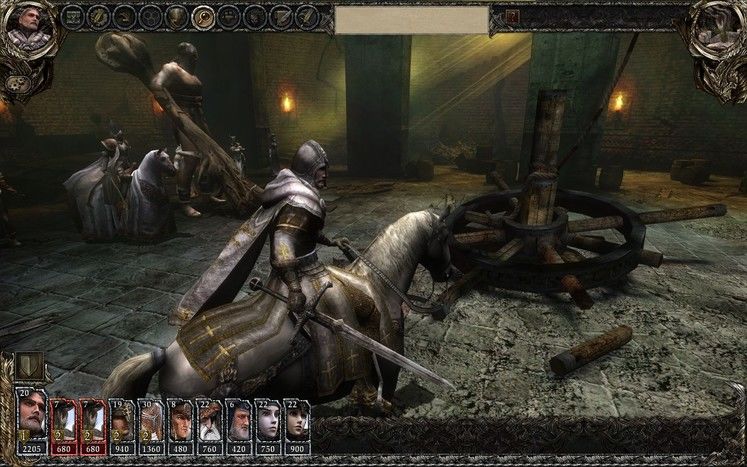For those of you new to the series, this is a turn-based strategy game, best referenced alongside the likes of Kings Bounty. Your basic objective in each of the three campaigns (human, elf, demon) is to spend finite movement points on wandering an overworld map to capture territory, battle foes, or obtain loot to build up your city - which then translates directly into character upgrades and unlocked abilities. Various settlements and buildings can be claimed along the way for stat-buffing effects, and dungeons litter the landscape with the usual temptation of loot at the cost of much danger.
 |
| I hope it doesn't trip |
The city, as hinted above, is the real heart of progression in Disciples, and provided you have the resources flowing in, you're granted one opportunity to build something new per turn. Building a magic tower unlocks the ability to research spells, for example, or building a guild will allow you to recruit thieves. Other buildings progress your unit types down one of several paths, allowing you to customise your party with specific tactical abilities that come in handy later in the game. This is where the strategy cocktail is at its most heady, and planning out your unit progression through the visual pleasantry of an ever-changing city is worth the install alone.
Complementing that, each of Disciples' maps is packed to the brim with content and a good level of detail. Splitting your party into two (fresh leaders and party members are recruited at your main city), enables quicker traversal and discovery of terrain, but at the cost of precious resources. Is it better to save your money for a lumbering Titan in your main party or to create a fresh group and open up battle on a new front? If nothing else, it seeds the game with a multi-faceted approach to strategy, and that's a welcome addition for those that like to add a dash of flair to their well thought-out plans.
 |
| Beware the large and angry thing |
Not that flair is particularly welcome in Disciples' grim world of course, where even the traditional fantasy trappings are layered on with a reverence that's quite unusual. It wants to be a serious and almost contemplative game, but it conveys that solely through dark gothic graphical stylings, a sombre tone, and an occasionally evocative orchestral soundtrack. When it works - and if you're able to get a little bit of the Linkin Park spirit past your defences - it's a thing of beauty; but when the gameplay pulls you out of the moment, it's the sort of design that ends up a little embarrassing for all concerned.
And unfortunately for the majority of strategy veterans out there, Disciples' combat engine will pull you out of the experience with relative frequency.
Battles now take place in scenic hex-filled arenas, with units initially lining up according to the group formation specified in your city. Movement ranges for each character are clearly marked, and then combat is a traditional affair that consists of manoeuvring your ranged units out of danger and your melee characters into the fight - or alternatively located as strategic cover for anybody taking a battering. Various power tiles litter the arena to accentuate damage or attributes when attacked from, and boulders, trees and other detritus block routes and create choke points to exploit tactically.
 |
| Where Titans hang out in the evening |
But those same rocks that block movement somehow fail to halt arrows and other missiles that magically travel straight through, whilst the power tiles are almost exclusively used by human players, with the AI seemingly unaware of their existence for the majority of the time. As a result of the apparent lack of depth here, battles are either ludicrously easy via way of kamikaze tactics from your opponents, or viciously difficult thanks to a few lucky criticals at the start that throw the balance completely out of favour. Combat is disengaging as a result and never quite feels fair; and that applies either when winning or taking a heavy loss.
Crushing any weakling with a mighty Titan
DISCIPLES III: RENAISSANCE VERDICT
With the majority of the game revolving around that system, it’s a shame that the developer couldn’t polish things to a higher shine, as the rest of the material deserves at least a little better. For all its faults though, Disciples is certainly something unique, and the quality of the overworld sections and general strategising may well be enough for a crowd that will inevitably seek it out anyway. If that’s you, you can add at least a point onto the score. For everybody else, your curiosity might pay off.
TOP GAME MOMENT
Crushing any weakling with a mighty Titan




